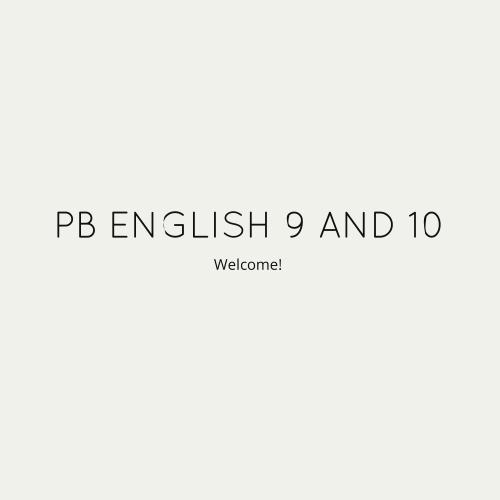8 September 2014
- Monday Fun Day (5 minutes)
- Present Scrapbook Pages
- Pastiche Assignment
- Reminder: Letter of Introduction due tomorrow
8 September 2014
- Turn in Scrapbooks
- Monday Fun Day (Five Minutes)
- Article Packet- Active Reading/Brief Introduction to Annotation
- 2nd period: I will be absent tomorrow to take my little Emily to her first day of pre-school. Mrs. Thompson will be here with you. Show her how awesome you are:-).
9 September 2014
- Turn in your "Letter of Introduction"
- Grab your Grade Defense from junior year
- 3rd period only: E.B. White Slideshow and Pastiche
- Start reading and annotating essays (1-3)
9 SEPTEMBER 2014
PB 9 English
- ACTIVELY READ THE ARTICLES
15 September 2014
- Reminder: 1 hour early release
- Turn in College Essay
- Monday Fun Day (5 minutes)
- Pass back graded work
- Pass out CAS Permission Slip #2
- New Pastiche Situation- Share Out
- Tomorrow= Discussion
9 October 2014
Achievement is not about what you've done, but what you've gained from your experience. -Lynn Hill
Literary Language:
Dramatic Monologue: A poem written in the form of a speech or extended narration that the person who is the speaker in the poem delivers to someone else. This kind of lyric poetry often describes a dramatic situation while also indirectly suggesting an important aspect of the speaker's personality.
Research/Annotate: Mrs Sisyphus and Mrs Faust
10 October 2014
Daily dose of literary language: Asyndeton
Asyndeton refers to a practice in literature whereby the author or poet purposely leaves out conjunctions in the sentence or line, while maintaining the grammatical accuracy of the phrase. Asyndeton as a literary tool helps in shortening up the implied meaning of the entire phrase and presenting it in a succinct form. This compact version helps in creating an immediate impact whereby the reader is instantly attuned to what the writer is trying to convey. Use of this literary device helps in creating a strong impact and such sentences have greater recall worth since the idea is presented in a nutshell.
15 October 2014
Ambiguity: capacity of words to have two simultaneous meanings in the context as a device for enriching meaning
ex: "Was he God? Of course not. Pilate believed he was". -Pilate's Wife
Anachronism: Chronological misplacing of person, event or object. ex: In "Faust", credit cards, mobile phones, and mortgage.
16 October 2014
Elegy: lament for the death or permanent loss of someone or something
"...if there's something that makes you laugh, then every day's going to be okay". -Tom Hanks
Ode: One of the oldest forms of poetry, a lyric that serves as a formal, serious poem of praise, often presenting philosophic ideas and moral concerns (1809).
20 October 2014
Do good and care not to whom.
- Italian Proverb
Hyperbole: Exaggerated statements that are not intended to be taken for the truth. Often called overstatement, hyperbole is often used for comic or ironic effect.
Lyric poetry: The word lyric comes from lyre, the small harp played by the Greek poets to accompany their songs. A lyric is a type of poem that is highly suggestive, deeply personal, and often intensely emotional. Among the types of lyric poetry are the elegy, the ode, and the sonnet.
28 October 2014
Another option for organizing your IOC:
1 - Audience / purpose
2 - Theme / content
3 - Tone / mood
4 - Stylistic devices
5 - Structure
"How we spend our days is, of course, how we spend our lives".
-Annie Dillard
13 November 2014
- Exam Registration
- IB Social
- "Rings" Commentary Practice
- Tomorrow- "Atlas"
31 October 2014
- Much Ado Opportunity
- Morning Study Group
- Kahoot Study Time!
17 November 2014
- Monday Fun Day!
- Change of Calendar
- Annotate and create an outline for "Water" and "Cold"- IOC partner practice tomorrow on both "Water" and "Cold".
8 September 2014 Agenda
By shantels
8 September 2014 Agenda
- 670



